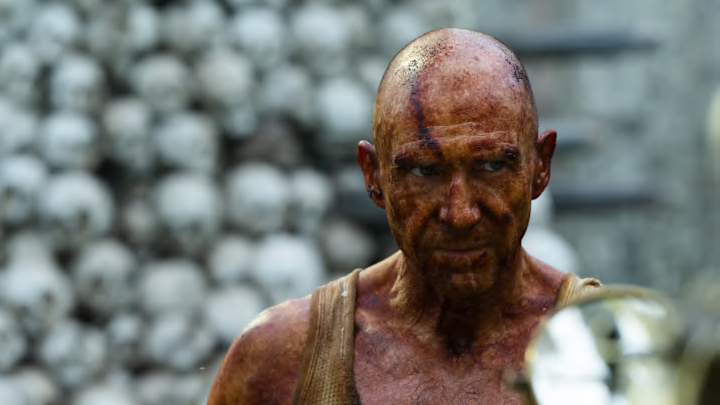In the past ten years, onlookers have observed Hollywood veterans undergo massive changes for future roles. Back in 2016, J.K. Simmons underwent a similar physical transformation while playing Commissioner Jim Gordon in Zack Snyder's Justice League, which many fans assumed was a sign that Gordon would get in on the action. Simmons' role, however, had nothing to do with his physical transformation, as it was simply maintained for health reasons.
Recently, Ralph Fiennes took on the challenge for The Return (2024). Yes, the acclaimed actor known for his portrayal of Harry Potter's greatest villain, Voldemort, and "M" in the James Bond films got ripped to play Odysseus in Uberto Pasolini's adaptation of the classic tale. The 62-year-old veteran actor attributes his transformation to an extremely strict diet and exercise regimen, which he spoke in depth about to The Guardian.
Ralph Fiennes Is The Best Odysseus So Far
In the interview, Fiennes detailed that his primary goal was to cut body fat. He engaged in lots of cardio and weight training, presumably daily, considering how cut Fiennes got for the role. Mind you, his physique isn't comparable to a model or another actor twenty years his junior. Fiennes purely looks much more fit than a person his age should. The muscle definition that he possesses in the film is indicative of someone dedicated to the work.
Moviegoers who haven't seen the movie be forewarned that Fiennes is no Dwayne "The Rock" Johnson. Expectations shouldn't include a broad-chested giant, period. Fiennes embodies Odysseus perfectly in that he's as physically fit and age-appropriate to play the character. No more, no less.

Greek history enthusiasts will recall that in the myth, Odysseus disguises himself from those he knows with an elderly man's face but then reverts to his younger appearance once the ruse runs its' course.
In The Return (2024), Pasolini doesn't utilize such an approach and instead attempts to make The Odyssey a grounded tale. Not once does the titular character mention Poseidon, sea demons, or anything related to mythology. This absence and lack of a magical disguise for Odysseus (Fiennes) support claims that the movie is grounded in reality. Bear in mind that The Odyssey is simply a tale. There are no Cyclops or Sirens or Scylla in our world; that's science fiction territory.
Odysseus is equally grounded in his approach and through his recovery. He realizes that returning as the King can't happen right away. He'll be met with hate, anger, and frustration, and will only lead to chaos in the kingdom. So, Odysseus gradually inches his way back to the royal palace.
Once there, he fights his way up the ranks, taking out his wife's potential suitors one at a time. His fighting style, too, is traditional in nature. Odysseus isn't flashy or reliant on exciting action moves. Odysseus' battles reflect the discipline of an actual soldier. For example, Fiennes' character doesn't resort to the exaggerated overhand swings, which are commonly dramatized in action movies—the way a lot of films tend to highlight "killing blows."
Instead, Pasolini directs Fiennes to use practical skills during combat. The audience, again, sees this trait on display when Odysseus stands over a fallen foe, preparing to deliver a killing blow. And rather than giving the audience a spectacle, Odysseus ends the man's life with a modest stab to the stomach, and that's all—no blood splatters or dramatic flourishes. Odysseus doesn't have to steady himself from the mental drain, nor exhibit any extra emphasis during the exchange, just a straightforward depiction of what the mythical man went through.
The Return offers what may be the most realistic depiction of The Odyssey that audiences may ever see. Fiennes and Pasolini are to thank for that, a fact that Greek philosophy enthusiasts will appreciate. While the mythos isn't everyone's forte, those of us who grew up reading stories of The Trojan War have long anticipated a grounded approach to these classic tales. Now, we have it.
The Return (2024) is currently streaming on multiple platforms, including Paramount Plus, Amazon Prime Video, and Sling TV.
